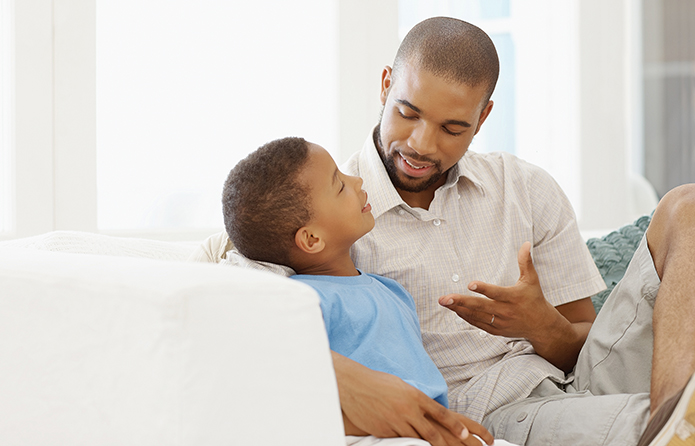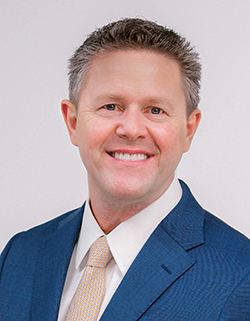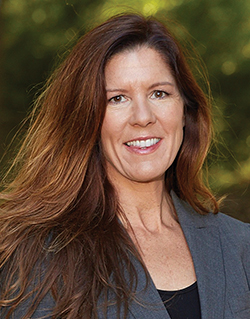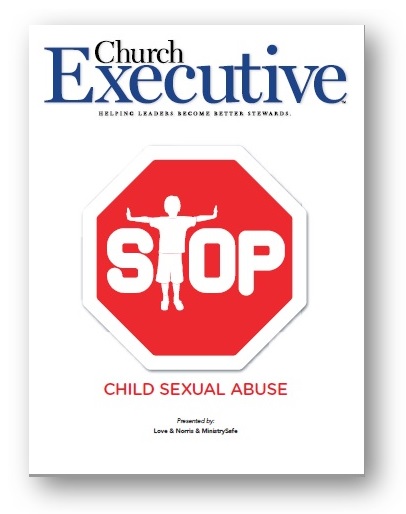
![]() By Gregory S. Love & Kimberlee D. Norris
By Gregory S. Love & Kimberlee D. Norris
Headlines related to child sexual abuse continue to rock the Church, and faith-based organizations continue to reevaluate sexual abuse response and resources.
The New Year provides a good opportunity to ‘check in’ on current church practices related to child sexual abuse. We asked Kimberlee D. Norris and Gregory S. Love — attorneys, sexual abuse experts and Church Executive guest editors — to speak into this topic.

Church Executive: Where Child Sexual Abuse is concerned, much has occurred since we began the ‘Stop Child Sexual Abuse’ Series. How is the Church responding?
Kimberlee D. Norris: In many respects, the Church is responding more proactively than in the past. The calls that we receive at the law firm are more likely to relate to a ministry attempting to proactively prevent sexual abuse or respond appropriately, rather than an actual crisis.
Church Executive: How are external forces playing a role?
Gregory S. Love: The risk of sexual abuse in child-serving programs is a given; a correct response is not.
Insurance companies are responding — requiring organizations to demonstrate meaningful protocols to PREVENT abuse.
Legislatures are responding — passing laws to require reporting

and prevention.
Denominations are responding — passing resolutions and identifying sexual abuse resources.
Right now, there’s significant urgency and movement.
Unfortunately, the local church, where the risk actually occurs, tends to be behind the curve.
Church Executive: Why is that?
Norris: Because the church is grace-based, forgiving, and tends to think the best of folk. In church contexts, if someone wants to work with kids, we assume their motivation is good and honorable. That’s not always the case. The church tends to have less screening, training and defined policies in place. As a result, it’s an easy in for abusers.
Church Executive: So, what SHOULD the church be doing?
Love: The church has a responsibility to create safe spaces for children who are participating in ministry programs, but we also have a responsibility to equip parents to protect their own children. Because parents are the primary protectors of their own kids.
A fundamental place of risk for any child is his or her home environment.
Church Executive: We see headlines about external risks — like scout leaders and youth volunteers. How is the child at risk at home?
Norris: Much of the risk never makes a headline: the risk unfolds in the child’s home environment — when the abuse is perpetrated by a family member, family friend, a caregiver or an older child in the family’s social circle. Parents clearly need help navigating child sexual abuse risk, and ministry leaders can — and should — play a role.
Church Executive: How can ministry leaders equip parents and families?
Love: Solving the problem of child sexual abuse starts with good information.
When ministry leaders understand the risk of sexual abuse and its incredibly destructive impact on children and their families, child safety becomes truly missional.
Successful child safety efforts occur when ministry leaders aren’t driven by crisis response or business decisions but are, instead, child- and family-focused.

Clearly, churches and ministries should be about ‘feeding and protecting the sheep,’ with a missional focus on the wellness of individual members and the family unit.
Protecting the sheep is just as important as feeding the sheep: if the sheep aren’t protected, all ministry programming is marginalized. Individual wellness and spiritual health are fundamental, and both are threatened by abusers who victimize children.
Church Executive: For a ministry leader who WANTS to equip parents in his or her congregation, what’s a good starting point?
Love: Good question! The place to start is in church programs that actually serve children — essentially ‘getting your own house in order.’
When children are gathered for any ministry purpose, the risk of sexual abuse exists.
The risk is foreseeable and therefore preventable: it must be addressed.
Because the risk is foreseeable, each ministry must develop an effective Safety System tailored to its specific programming and the children served.
Learn more about an effective Safety System by downloading the “Stop Child Sexual Abuse” series eBook.
Once a church has a REAL Safety System in place, it should endeavor to equip parents with good information and resources.
Church Executive: What specific resources should church leaders offer to parents in the congregation?
Love: Effective training is the key. Good training daylights the misconceptions that most of us hold on to, because this risk is not intuitive. Abusers are actively misleading parents by grooming the gatekeepers — the parents themselves — to believe that the abuser is a helpful, trustworthy individual.
It’s incredibly helpful for parents to understand the Offender’s Grooming Process — the process by which an abuser targets a specific child, grooms him or her for inappropriate sexual interaction, and keeps the child silent after the abuse occurs.
In church contexts, if someone wants to work with kids, we assume their motivation is good and honorable. That’s not always the case. The church tends to have less screening, training and defined policies in place. As a result, it’s an easy in for abusers.” — Kimberlee D. Norris
Church Executive: How does MinistrySafe help churches who want to equip parents with good information?
Norris: We developed Parent Training to equip parents to better understand child sexual abuse and better protect their own children. Sexual abusers have no visual profile — but can be recognized by their behavior.
Parent training walks through common misconceptions about sexual abuse and sexual abusers, abuser characteristics, the abuser’s grooming process and common grooming behaviors — from a parent’s perspective.
The whole purpose is to equip parents with better information, including questions they should be asking in the programs or activities where their child spends time.
We address issues like sleepovers, sports involvement and peer-to-peer issues.
I’m a mom: this is information I’d want in the hands of EVERY parent.
Church Executive: What’s a starting point for a PARENT who wants to be proactive about protecting their own child?
Norris: Starting the conversations about sex and sexuality VERY early!
We are the primary protectors of our children, and it isn’t my child’s responsibility to protect herself.
At the same time, arming my child with good information about sexual topics is fundamental in helping my child better navigate the world in which we live.
That means providing real names for body parts, not pet names, and answering questions honestly, in an age-appropriate manner.
Telling my child that NO ONE should touch her body any place that her bathing suit would cover and giving her permission to say NO! to anyone who attempts to. Teaching her to come tell ME or another adult she trusts when she experiences any interaction with ANYONE, adult or child, that makes her uncomfortable.
Teaching her to go places in pairs or threes — having a wing man!
Good training daylights the misconceptions that most of us hold on to, because this risk is not intuitive. Abusers are actively misleading parents by grooming the gatekeepers — the parents themselves — to believe that the abuser is a helpful, trustworthy individual.
— Gregory S. Love
Church Executive: This is an anxiety-producing topic for parents: ‘having the sex talk’, right?
Norris: One of the issues I encounter over and over is parents feeling anxious or concerned about having the conversation about sex or sexuality with their child. Many are concerned about scaring their child, saying, “I don’t want to overwhelm with detail. I’m anxious about starting this conversation.”
Church Executive: Can you speak to that?
Norris: This is one reason churches have to get in the game — arming parents with good information and encouraging them to USE it! I encourage parents to start this conversation at 2 or 3 years of age, before the topic becomes awkward. All kids have natural curiosity about sexual topics, and they are going to get the information from somewhere — it should be from us, their parents. Abusers take advantage of a child’s natural sexual curiosity to introduce sexual topics and secrecy — don’t leave that door open!
MinistrySafe provides online resources developed to protect children, whether in a ministry program or at home. Contact MinistrySafe to request a link for Sexual Abuse Awareness Training or a link for Parent Training, or to connect with a representative.
Kimberlee D. Norris: As a mom, I thought it would be helpful to hear from my daughter, Georgia, a second-year law student, about the importance of starting the conversation about sexuality early on.

Norris: Many parents feel anxious or concerned about starting a conversation with their child about sex or sexuality. Can you speak to that?
Georgia: It’s so much easier if you start early — when your child is young. You make it gradual and natural, so it’s not just a massive dump of information offered to a preteen or teenager.
In my case, you opened a line of communication between us — a very natural conversation that built on itself. You answered my questions whenever I asked — I knew that you were a good source of information — and I trusted you. I always felt comfortable coming to you with whatever weird questions I had.
Norris: As you grew up, did you feel like the information became more relevant?
Georgia: Yes. I think we had a very special but atypical mother/daughter relationship. I mean I asked you more questions than I searched on Google! I wasn’t learning from movies like my friends were, I was asking my mom.
Norris: One of our early conversations was about the concept that ‘if anybody touches you in a place that your bathing suit covers, mama or daddy needs to know about it.’ And we had an experience early on. Do you remember that?
Georgia: Yes, I remember. We were at the pool — I was 4 1/2 or 5 — and a little boy swam by me and brushed my side. I was concerned because I knew that if someone touched me where my swimsuit covered that I needed to tell my mom. So I marched up to you and said, very seriously, “Mom, a little boy swam by me and touched my side, right here where my bathing suit covers.”
And you said something like, “Well, sweetheart, do you think it
was intentional?”
I said, “Probably not.” And you said “Okay, well, he probably just accidentally brushed you as he swam by, and that’s not a problem. But thank you for telling me.”
Norris: So it wasn’t a big deal, but you came and told me. And that’s exactly what I wanted. I wanted to know if you encountered that, and you did. I wanted open lines of communication with you.
Early on, we talked about the fact that you choose who you are physically affectionate with, and that YOU always had the right to say NO. This became an issue with relatives who expected very close physical affection with you when you were very young. Do you remember that?
Georgia: Yes. I remember feeling sort of trapped, because they wanted physical interaction that just scared me. I remember you telling me that it was okay to say no. That was huge: I didn’t know it was okay to say NO!
After I told you I was scared, you protected me from that, and you were firm about it.
I really don’t see that with many kids: I think most kids think that it’s not an option to say NO to an adult in a position of authority. I knew I had the right to say no, and that was empowering to me.
Norris: As you got older, the options for where you spent time became broader. You started getting invitations for sleepovers and parties outside our home. We had pretty significant boundaries in place concerning where you could go, and there were places you didn’t get to go. We waited until you were quite a bit older before allowing you to spend the night in homes that we had heavily vetted. How did that feel at the time, and how do you see it today — as an adult?
Georgia: At the time, in middle school, I felt like you were cramping my social style, but it wasn’t a really big deal because our house was the place to be, and I had lots of people over.
As an adult, especially given what I now know about some of those situations, I am so grateful. Because I think a lot of parents didn’t have the same standards or do the same due diligence, and that ended up hurting their kids.
Norris: As you grew up, in middle school and beyond, we unabashedly made our house the fun place to be. And we did that purposefully, because I know what’s happening in my house. As an adult, what’s your perspective on that? Will your house be the ‘fun house’?
Georgia: I think it’s a complete model for what I want our house to be in the future. And I love the idea of providing clean and unadulterated fun for my kids, but also creating an environment where I control the boundaries and I know what protections are in place.
Norris: Growing up, did you ever have a ‘liver quiver’ — a circumstance that caused you to think I don’t know about that circumstance or that individual?
Georgia: For those of you who don’t use ‘liver-quiver’ in your daily vocabulary, in our family, it means that sick feeling in your stomach like, “I shouldn’t be here” or “this shouldn’t be happening.”
I’ve experienced that a number of times growing up, and it was about certain people or situations. You gave me so much information growing up to prep me for those dangers. It was really interesting to see how weeks or months later I would learn something about that person or circumstance, or the person would be fired or let go, and I’d feel like, “Oh, okay. That’s what that was.”
Norris: So you felt like you had eyes to see.
Georgia: Yes — a different lens or category.
Norris: Some parents feel, “Well, I don’t want to make my child paranoid or fearful.” Did you feel fearful or paranoid?
Georgia: No. In my own skin, I’m not naturally a very careful person. But knowing what I did, I was able to evaluate circumstances and individuals differently and know, okay, that’s not right — something is off there.
Norris: You felt equipped?
Georgia: Yes.
Norris: One of the principals we talk about in Parent Training is to be very present. Don’t be the drop-off parent who drops off early and shows up late. Volunteer; stay for practice. Drop in when you are not necessarily expected. Show up.
But there’s a tension there between being very present and becoming a helicopter mom or dad. I’m putting you on the spot here, but did you feel like the environment you grew up in was oppressive or ‘over the top’?
Georgia: No, I didn’t feel like it was over the top. There were times that I had more restrictions than other kids. But I never felt like you guys were hovering, in part because you were always creating new ways to have fun.
Norris: So that helped?
Georgia: Sure, it helped that all the fun things were happening in our house. At the same time, you and dad really valued freedom, and you gave me lots of freedom and independence where it was safe to do so. So I never felt restricted.
As I got older, particularly in college, it became pretty clear that my home of origin was different. Many of my college friends described stereotypical parents who didn’t go to games, shows or recitals or just didn’t show up. Many were either raised by their siblings or simply fended for themselves, and many of them had experienced sexual abuse.
Norris: It’s heartbreaking, isn’t it?
Georgia: Yes, it is. And as an adult, I see the ongoing ramifications.


